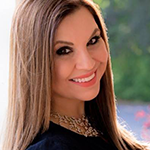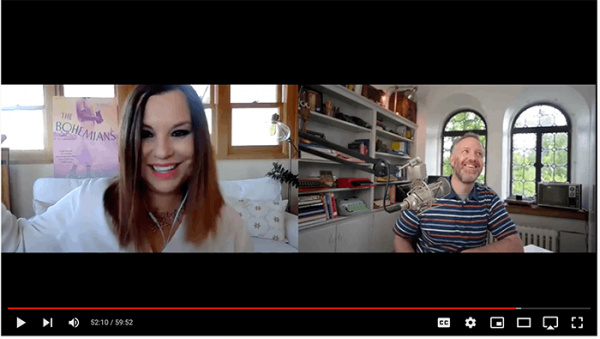When I asked author Jasmin Darznik if she had a sense of permission to create when growing up, she replied: “Not at all. It’s not even that I didn’t feel permission, I felt prohibition.”
In working with writers and creators to help them feel a sense of clarity in what they share and how they connect with their audience, something I think about a lot is perseverance. When I was younger I was a long distance runner, and the concepts of endurance and stamina are things drilled into my mind. Mile after mile.
I think this is why I am so fascinated with stories of those who create. I was listening to an interview between Conan O’Brien and Tom Hanks the other day, and Conan was explaining how in his four years as a writer on Saturday Night Live, he had never seen a host work as hard as Tom Hanks. He described how all of the other guests would pop into the writers room, then go out to dinner. But Hanks stayed all night with the writers, working out ideas for sketches. He said of Hanks:
“Everyone else would dip in and out. You were alone in your dedication in making it a great show. You are an example of someone who… it’s not an accident. I can’t believe how hard you worked.”
That phrase, “it’s not an accident” is part of why I’m so enamored with the lives of those who create and share. A question I’m always exploring is: if the process is difficult for everyone, what leads to success?
 So today I’d like to talk about Jasmin Darznik and her journey as a writer. There is so much in her story that resonates deeply and serves as an inspiration for what it means for each of us to find our own paths to develop our creative vision and ensure what we create connects with others in a meaningful way.
So today I’d like to talk about Jasmin Darznik and her journey as a writer. There is so much in her story that resonates deeply and serves as an inspiration for what it means for each of us to find our own paths to develop our creative vision and ensure what we create connects with others in a meaningful way.
She published her most recent novel earlier this year, The Bohemians, and it currently has more than 400 reviews on Amazon. Her previous novel, Song of a Captive Bird (292 Amazon reviews), was published in 2018. This was a creative shift from her first book, the memoir The Good Daughter: A Memoir of My Mother’s Hidden Life (187 Amazon reviews), in 2011.
Why am I sharing the number of Amazon reviews for each book, especially after I wrote last week about focusing on the depth of connection, not the breadth? It’s simply a way to illustrate that Jasmin’s work has been finding an audience. She is someone who consistently engages readers. Jasmin is developing her body of work, year after year, one book at a time.
It didn’t start out this way. Growing up, this is what framed Jasmin’s experience with writing:
“I kept diaries when I was little, which my mother habitually read. So it was a creative act, but it always accompanied by the potential for some kind of punishment or shame. How can you be honest in a diary when you know that’s going to happen? From when I was 8 years old. I grew up with a sense that writing was dangerous. Yet it was absolutely something I was drawn to. My attraction was to books and writing.”
Born in Iran in the 1970s, Jasmin immigrated to the United States when she was five. Her parents were a nurse and engineer in Iran, and when they arrived in the US, they bought a small motel in California. Jasmin spent a lot of time here, and described it as “a scary place” that also provided material for her future writing: the characters, place, and situations she would observe.
She knew her parents expected her to get married young, and this pressure helped fuel her move into academia. She had a teacher who encouraged her to write, someone who still comes to all of her book readings to this day. She studied English at UCLA, then went to law school. But here, she made a creative shift:
“It was very clear I didn’t want to practice law. I was applying to graduate schools in English. While everyone else was applying for internships at fancy law firms, I applied for a semester studying creative writing at Harvard. I was planning my escape, my exit. I took some graduate courses in English at Berkley. That is where I feel like my life began. I got a fellowship, was able to move across the country to Princeton, NJ. It felt like a move toward independence.”
Even then, writing did not seem like a viable option for her career. In her early 20s she hoped to become an English professor, saying, “I definitely did not think I was going to be a writer, I was still a decade away from thinking that was a possibility for me.”
Then writing became her escape. “I began taking a creative writing class [at local bookstore Book Passage.] That wound up being the beginning for me as a writer. I was in that class for two years, 10 weeks at a time. It was once a week on Friday nights — I lived for those Friday nights. I was so happy to be with other writers and in a place to be seen.”
“What surprised me a lot is that people were interested in [my writing.] I did not think I had stories that would be interesting to anybody. It was the women in the workshop and my instructor who were so encouraging and genuinely interested in the stories I was telling. That was transformative.”
She was encouraged to develop her writing more and more, and to try to get stories published in local newspapers. When her first piece was published in a small local free paper, she said, “I felt like I had made it.”
Jasmin described how the process of sharing fuels the creative process:
“I was lucky that I had someone early in my writing who was telling me, ‘publish.’ One of the things it teaches you is to finish things. Knowing you will submit it, makes you work harder on it. Getting in the habit, finish it, send it out. You are in the game now.”
From there, she got an agent, published a memoir, and then a novel. She and I worked together as she prepared for the release of her latest novel, The Bohemians. Part of that work was developing her social media presence, which she dove into. I asked why she continues to share so much and she replied: “I love writing.” She views social media as a way to write and publish even more frequently, especially since a book can take years to write and publish.
>For The Bohemians book launch, she focused on publishing essays and meeting with book groups. She does quite a few of these each month and described the experience this way: “I’ve enjoyed some of those conversations more than anything else in my career.”
You can listen to or watch my full conversation with Jasmin here:
You can find Jasmin in the following places: her website and Instagram.
Thanks!
-Dan

